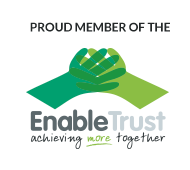Therapies and Interventions
Two Bridges has access to a wide range of therapies and interventions. These enhance both the educational and the personal development of the child in a holistic way.
You can find out more information about the full range of interventions that we offer our young people below.
Arts Therapies
The Arts Therapies service is a team of 10 HCPC registered Art Therapists and an assistant who is based with the Bristol Adult Community Learning Disabilities Teams, but also provide Arts Therapies to children and young people who have moderate to severe learning disabilities in Bristol and South Gloucestershire. The organisation who employs the creative therapists is Sirona Care & Health.
Arts Therapies work through art, drama or music to help children express and explore their feelings, working verbally and non-verbally. They aim to build a safe and trusting psychotherapeutic relationship where the child or young person can feel able to share their thoughts, and work through troubling issues. The content of sessions is confidential but they liaise with teachers, mentors, parents or carers to share general themes arising from the work.
Through the Arts therapy process we aim to do the following
-
to provide a safe space for expression of feelings
-
to enable exploration and understanding of feelings
-
to alleviate distress caused by difficult feelings
-
to increase self-esteem and confidence
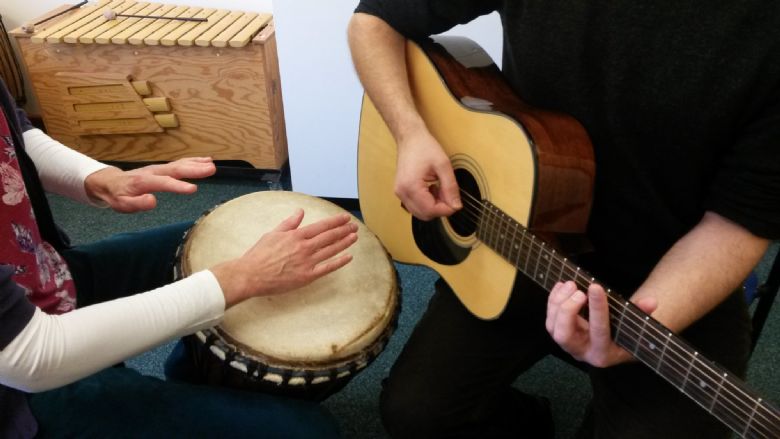
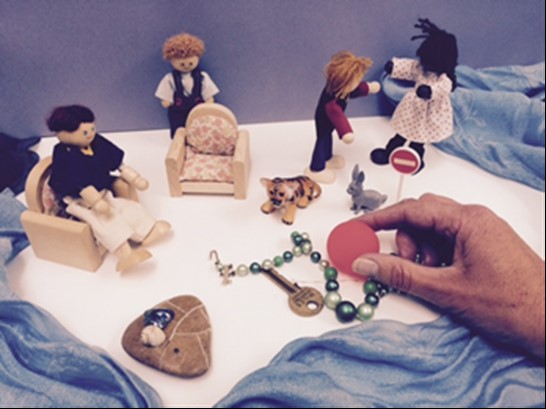
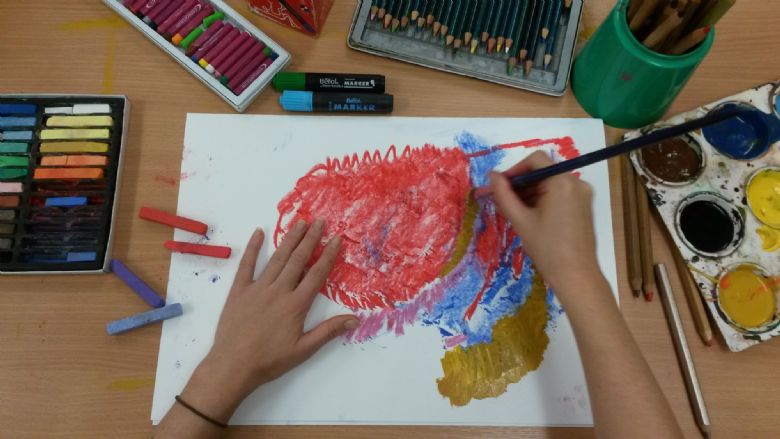
Aquatic Therapy
Hydrotherapy or Water Therapy, is a complimentary therapy that uses water for health purposes. It supports muscle strength, independence and opportunity to weight bear.
Pupils eligible are given the opportunity to have a 30 minute weekly slot in the pool, either at New Siblands School or Two Bridges Academy. The physiotherapist carries out an assessment and writes a programme of exercises or activities for a child, this is a reviewed at intervals. Children are supported either 1-1 or 2-1 by dedicated swimming assistants to undertake their individualised programme.
The 4 key features that make hydrotherapy an effective therapy are:-
- Buoyancy – Aids balance, reduces pain and supports bodyweight whilst strengthening the muscles.
- Water Resistance – Builds up their strength level.
- Hydrostatic Pressure - Pressure on the body helps relieve tightness and reduce swelling.
- Water Temperature – Eases the mind, relaxes muscles and relieves anxiety.
Hydrotherapy exercises can help students to improve their:-
- Oral motor skills and respiratory control – by blowing bubbles, or blowing a lightweight object along the surface of the water.
- Muscle strength – Activities using a water noodle can build muscle in the arms and core without it being obvious to the pupil.
- Concentration and confidence, reducing overall anxiety and stress.
Occupational Therapy
A young person at Two Bridges Academy may see different Children’s Occupational Therapists for different reasons:
- A Community Children’s Occupational Therapist for advice around self care such as toileting and eating. They can look at supportive seating within school to enable the child to access their learning and to help maintain a good posture.
- A Social Services Occupational Therapist for home equipment needs and adaptations.
Physiotherapy
Physiotherapy focuses on how muscles, joints and pain can affect physical skills, posture and walking leading to a functional difficulty.
If a student has Physiotherapy involvement they work collaboratively with the teaching staff across the school. They like to also work collaboratively with parents. This often involves setting joint goals with parents and/or school. Therapy programmes are then set to meet these goals.
Physiotherapists also assess children for supportive standing and walking equipment where it is required.
School Nurse
The School Nursing Team can help with a number of issues as shown in the poster below.
There is information below about how to refer to the School Nursing Team.
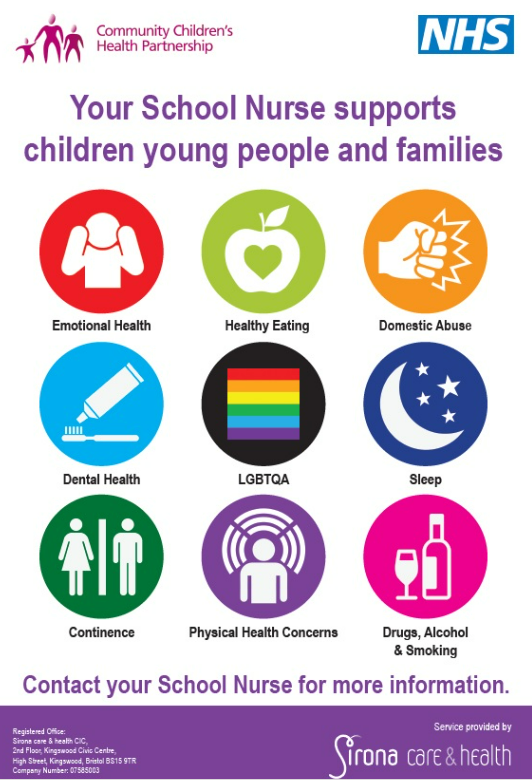
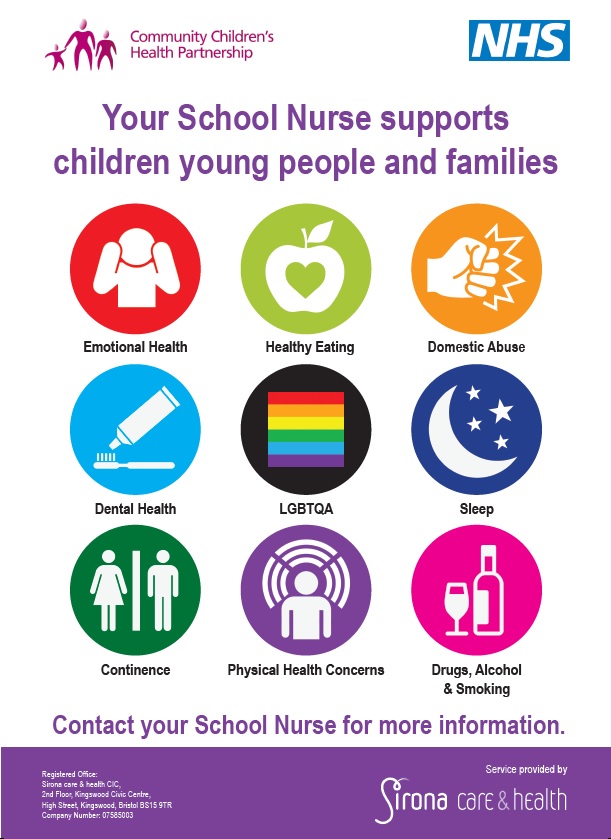
Speech and Language Therapy (SALT)
Enable Trust has the vision of ‘Working together passionately to achieve the best outcomes for our SEND children and young people’.
During the academic year 2022/2023 Enable Trust schools reviewed their therapeutic provision and created a Speech and Language Therapy (SALT) Team. As Enable Trust and Therapy Team expand a workable model is being developed which will grow in readiness for a longer term sustainable way of working and therapy provision which can provide outreach opportunities outside the Trust.
Jane Stonehouse is the Lead Speech and Language Therapist and Michelle Jefferies is the Assistant Speech and Language Therapist for Enable Trust. They work across Two Bridges Academy, New Siblands School and Culverhill School during the week.
The Core speech and language therapy service, provided by NHS, works in collaboration with educational settings and they support students with high level AAC needs and eating and drinking difficulties.
The Enable Trust Speech and Language Therapy (SALT) Team may support children in the following areas:
- Developing pupil’s language and communication skills.
- Developing alternative methods of communication e.g. Makaton signing, communication books, PECS, high tech communication aids etc
- Developing pupil’s social communication skills.
- Developing pupil’s speech sound production.
- Developing fluency when talking
- Developing pupil’s eating and drinking skills and assessing the safety of their swallow.
The SALT Team are able to assess individual pupil’s speech, language and communication skills when appropriate. Following this, advice and recommendations are provided to help the pupil’s develop their areas of need. They will see pupil’s to provide SALT provisions as detailed in their EHCP’s.
The SALT team also work very closely with the teaching staff to ensure that:
- Explicit communication and interaction approaches are embedded in every lesson.
- Practical SALT activities are embedded in most lessons across the curriculum.
These are crucial aspects of our work within Enable Trust Schools because progress with communication and interaction skills requires daily inputs and these are most effective when delivered within the school curriculum.
Children may be seen in school for therapeutic SALT interventions, either individually or in groups. In addition, for some pupils, SALT interventions and programmes of work are delivered by school staff under direction and oversight from the Speech & Language Therapy Team.
The Enable Trust SALT model has been devised to show the offer for all students. Each students needs will be assessed and they will be assigned a tier. The below shows the level of input they require by class team and SALT. Many aspects of our SALT provision are delivered in class as part of our total communication approach.
|
Tier 4 External specialist SALT for highly specialised support |
|
Tier 3 Direct input from SALT
|
|
Tier 2 Input from SALT team with oversight from SALT
|
|
Tier 1 Needs met by whole class communication approach Class team led with input from SALT team
|





